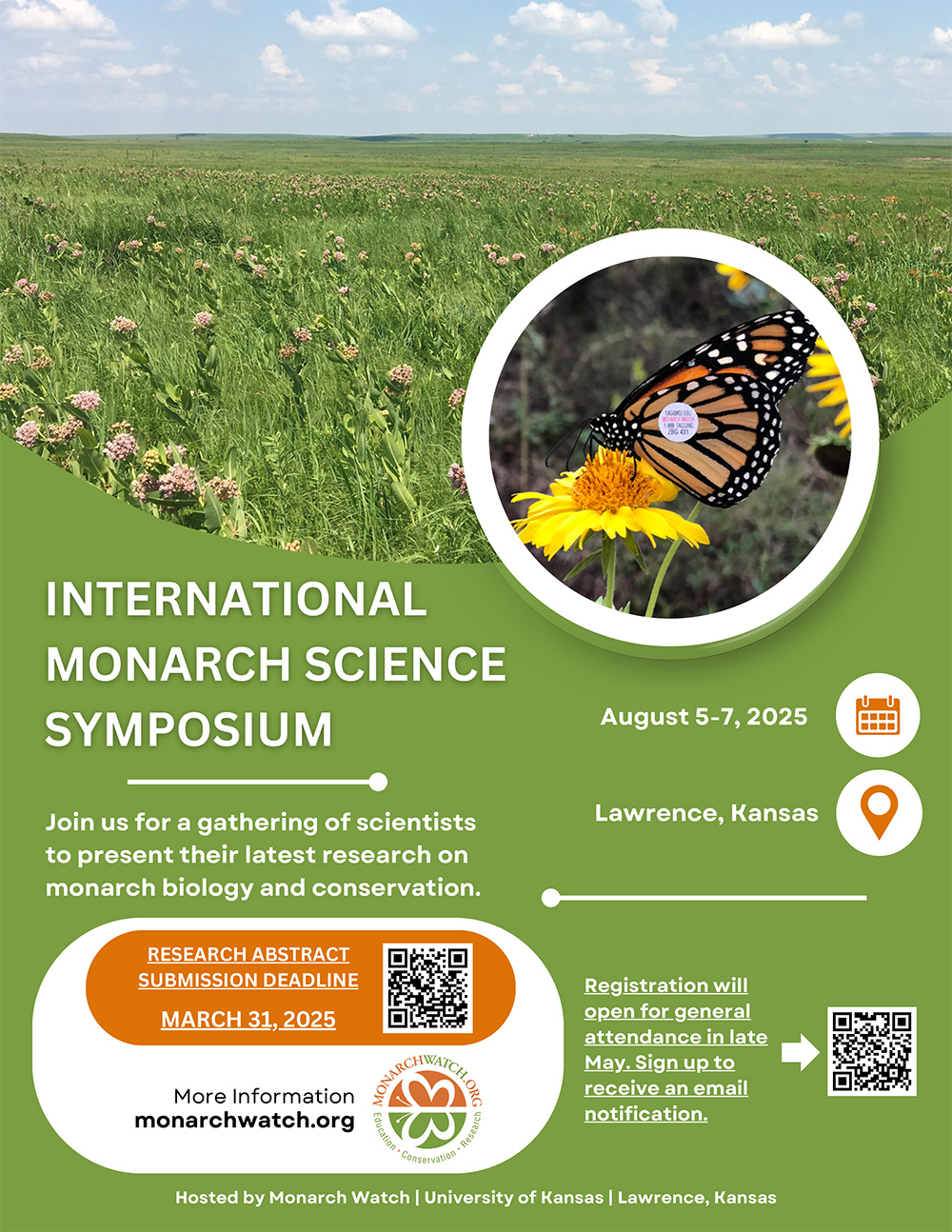 Updated: 8 July 2025
International Monarch Science SymposiumThe last day to register is July 14, 2025. Join us in Lawrence, Kansas, August 5-7, 2025 to learn more about monarchs, hear about the latest monarch research from scientists, and connect with folks from all over the world who are passionate about these spectacular butterflies. We have more than 45 scientists scheduled for presentations as well as several panels and poster sessions. Please check this page periodically for updates and thank you for your interest! | |||||||||||||||||||||||||||||||||||||||||||||||||||||||||||||||||||||||||||||||||||||||||||||||||||||||||||||||||||||||||||||||||||||||||||||||||||||||||
SYMPOSIUM SUMMARY |
|||||||||||||||||||||||||||||||||||||||||||||||||||||||||||||||||||||||||||||||||||||||||||||||||||||||||||||||||||||||||||||||||||||||||||||||||||||||||
 What: International Monarch Science Symposium When: August 5-7, 2025 Where: Lawrence, Kansas (hosted by Monarch Watch at The University of Kansas)
Who: Scientists, researchers, students, and others interested in monarchs are welcome to attend. Important Dates: • March 31, 2025 - research abstract submission deadline For Presenters: • Research Abstract Submission Form Registration: • Early registration (June 12-July 7): closed *Travel scholarships are available for student presenters, early-career scientists, and international speakers. Please note your interest in the field on the research abstract submission form. Terms & Conditions: We are committed to a safe, respectful, and positive symposium experience for all participants. Harassment, discrimination, or disruptive behavior-whether in-person, online, or on social media-will not be tolerated. By registering, you agree to respect others' opinions and personal space. Violators may be removed without a refund. Photos, videos, and other recordings may be taken during the symposium, including pre/post and virtual events. By registering, you consent to being recorded and authorize Monarch Watch and its representatives to use the content for educational or promotional purposes (e.g., news, websites, social media). Cancellations: Cancellations made by July 11, 2025 will receive a full refund. Cancellations after this date will be refunded minus a $50 administrative fee for non-recoverable costs. Please contact us at monarch@ku.edu to cancel your registration. Contact: monarch@ku.edu |
|||||||||||||||||||||||||||||||||||||||||||||||||||||||||||||||||||||||||||||||||||||||||||||||||||||||||||||||||||||||||||||||||||||||||||||||||||||||||
GENERAL SCHEDULE OF EVENTS |
|||||||||||||||||||||||||||||||||||||||||||||||||||||||||||||||||||||||||||||||||||||||||||||||||||||||||||||||||||||||||||||||||||||||||||||||||||||||||
|
Below is a general schedule of events. A complete schedule including presenters and presentations will be posted online as soon as it is available. TUESDAY, AUGUST 5, 2025
WEDNESDAY, AUGUST 6, 2025
THURSDAY, AUGUST 7, 2025
|
|||||||||||||||||||||||||||||||||||||||||||||||||||||||||||||||||||||||||||||||||||||||||||||||||||||||||||||||||||||||||||||||||||||||||||||||||||||||||
TENTATIVE LIST OF PRESENTERS |
|||||||||||||||||||||||||||||||||||||||||||||||||||||||||||||||||||||||||||||||||||||||||||||||||||||||||||||||||||||||||||||||||||||||||||||||||||||||||
|
Below is a tentative list of symposium presenters; details subject to change.
|
|||||||||||||||||||||||||||||||||||||||||||||||||||||||||||||||||||||||||||||||||||||||||||||||||||||||||||||||||||||||||||||||||||||||||||||||||||||||||
FIELD TRIP OPTIONS |
|||||||||||||||||||||||||||||||||||||||||||||||||||||||||||||||||||||||||||||||||||||||||||||||||||||||||||||||||||||||||||||||||||||||||||||||||||||||||
|
We have a few field trips and tours available on Tuesday, August 5th, before the symposium. These trips can be selected on the symposium registration page and will be added to registration costs at checkout. Please be sure to note the timing of each field trip, as there is some overlap.
|
|||||||||||||||||||||||||||||||||||||||||||||||||||||||||||||||||||||||||||||||||||||||||||||||||||||||||||||||||||||||||||||||||||||||||||||||||||||||||
TRAVEL & ACCOMMODATIONS |
|||||||||||||||||||||||||||||||||||||||||||||||||||||||||||||||||||||||||||||||||||||||||||||||||||||||||||||||||||||||||||||||||||||||||||||||||||||||||
|
All events are taking place in Lawrence, Kansas on or around the University of Kansas campus. The nearest airport is Kansas City International (MCI) which is about a 50-mile drive from Lawrence. You will need to make arrangements for transportation during the duration of your stay, including getting to and around Lawrence. TRAVEL
ACCOMMODATIONS
| |||||||||||||||||||||||||||||||||||||||||||||||||||||||||||||||||||||||||||||||||||||||||||||||||||||||||||||||||||||||||||||||||||||||||||||||||||||||||
SYMPOSIUM SPONSORS |
|||||||||||||||||||||||||||||||||||||||||||||||||||||||||||||||||||||||||||||||||||||||||||||||||||||||||||||||||||||||||||||||||||||||||||||||||||||||||
|
|
|||||||||||||||||||||||||||||||||||||||||||||||||||||||||||||||||||||||||||||||||||||||||||||||||||||||||||||||||||||||||||||||||||||||||||||||||||||||||
DONATE TO MONARCH WATCH |
|||||||||||||||||||||||||||||||||||||||||||||||||||||||||||||||||||||||||||||||||||||||||||||||||||||||||||||||||||||||||||||||||||||||||||||||||||||||||
|
If you enjoy the various educational, conservation, and research programs Monarch Watch offers throughout the year, please consider making a donation today - it's quick, easy, secure, and fully tax-deductible. You can even set up a recurring gift (monthly or annually) if you'd like. We rely on contributions from Monarch Watchers just like you to keep the program going - thank you for your continued support! If you would rather mail in a donation or have questions, please visit Giving in Support of Monarch Watch. |
All material on this site © Monarch Watch unless otherwise noted. Terms of use.
Monarch Watch (888) TAGGING - or - (785) 864-4441
monarch@ku.edu
